Health
Ray Peat Inspired Carrot Salad Recipe
General health and hormones need to be balanced to get the most out of light therapy. So today we are going to make one of the most ‘cleansing’ salads possible – a raw carrot salad. This recipe works great in the morning, but can be eaten any time of day.
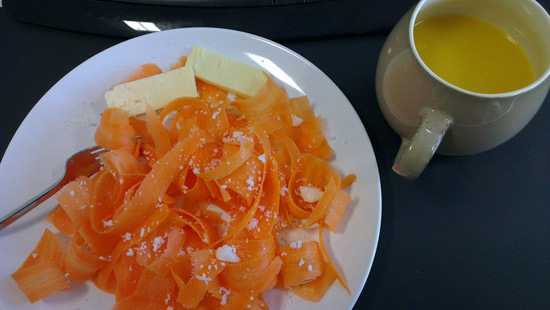
One of the least known toxins in our environment is called lipopolysaccharide (also known as endotoxin), and is produced by gut bacteria. In fact these lipopolysaccharide molecules are actually found on the outer membrane of your normal gut bacteria…scary stuff.
As endotoxins are extremely damaging to the liver, illicit a powerful immune response and lead to systemic inflammation, we want to lower the amount of them in our digestive tract right? This is where the raw carrot and coconut oil come in handy. The net physiological effect of this recipe is to reduce bacterial endotoxin & oestrogen (as well as other ‘downstream’ stress hormones – aldosterone, serotonin, prolactin, cortisol, etc), and to increase progesterone/testosterone/DHEA/T3 and other ‘youth’ hormones.
Ray Peat Inspired Carrot Salad Recipe
Prep Time: 5 minutes
Total Time: 5 minutes
Calories per serving: 100
Fat per serving: 10g
Ingredients
- Carrots
- Salt
- Coconut oil
- Vinegar
Instructions
- Wash the carrot to clean dirt off the outer skin and start peeling/grating.
- Keep peeling the carrot or grate it
- Keep going….
- Add 1.5 teaspoons of salt
- Add 1 tablespoon of coconut oil (or MCT or olive oil)
- Add a few drops of vinegar
- Mix up the ingredients like with any salad.
This recipe may not look so delicious on first glance, but actually tastes great. The salt draws some of the water out onto the carrot surface, leaving a salty, crunchy & velvety consistency. The coconut oil also contributes to the smoothness of the salad and helps it to go down much easier.
Sometimes I also like to add lemon/lime juice, honey, or maple syrup to improve the taste and add variety. I frequently have cheese, cottage cheese, meats, paté and a side serving of fruit juice with the salad too.
Note: vinegar, lemon juice and fruit juice can be bad for teeth enamel – consider rinsing the mouth out with water afterwards. Long-life pre-prepared lemon juice can be loaded with sulfite preservatives that are best avoided – stick to freshly squeezed or vinegar.
That’s it! Simple but effective. Take daily and consistently for several weeks to notice a dramatic change in bowel health.
Carrot benefits:

It is important to note that carrot juice (or carrots that have been blended in a smoothie) will not have this same effect. Carrot juice is high in beta-carotene which, due to being an unsaturated molecule, will usually have strong anti-thyroid effects when consumed in excess. When raw carrot fibre is consumed however, most of the beta carotene is not absorbed. Raw carrot can also reduce blood glucose levels if eaten alone, so drinking some fruit juice, coke, milkshakes or sugar-sweetened coffee with it will help to prevent hypoglycaemia/cortisol.
Stick with organic carrots if possible to reduce pesticide exposure. Go for paler or white rainbow carrots too if you can get them, as the orange pigment (beta carotene) is an unsaturated molecule and prone to oxidation. Get your vitamin A from egg yolks and liver instead!
Coconut oil benefits:
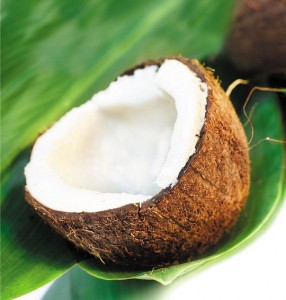
Coconut oil is similar to raw carrots, in that it has a very antibiotic-like effect on the bowel. This effect synergises with the raw carrot to produce a solid combination. The medium chain fats found in coconut also help to raise metabolism and free thyroid hormone, and you should feel warmer for about 1 hour after eating this meal.
I would have recommended organic extra virgin coconut oil if you asked me 12 months ago, but more recently I have found superior results from plain old refined coconut oil – it’s cheaper, less likely to cause side effects (such as nausea and diarrhea), is tasteless and odourless, and the fats are not damaged by the refining process anyway!
Salt benefits:
In this recipe I use himalayan salt (which may potentially be problematic due to iron content) because I like the taste, but any type of pure salt (without fillers/bulkers) is fine. Sea salt is fine.

Restricting salt is an extremely unhealthy and uninformed thing to do: a few extra grams of salt per day has been associated with reducing the incidence of heart health issues by 1/3. It is true that restricting salt may lead to a small drop in blood pressure, but this has never been linked to an improvement in health, even in hypertensive people.
Vinegar benefits:
Vinegar (or the active compenent – acetic acid) has a mild disinfecting effect on the bowel. While this sounds similar to both coconut oil and carrot fibre itself, vinegar works on a different level to both, greatly enhancing the effect.
A few drops added to a carrot salad will shut down any fermentation in the bowel, thereby curtailing endotoxin production from bacterial proliferation.
It is important however, to use a clear/filtered/distilled vinegar, as many of the unfiltered variety are allergenic themselves. Many organic apple cider vinegars that contain ‘the mother’ for example, also contain various bacterial and fungal metabolites and waste products which may be problematic for some people. The least problematic type of vinegar would be a standard distilled white vinegar (which is basically just acetic acid in water). Other clear vinegars may be fine depending on personal tolerance so don’t be too worried if you much prefer the taste of another type.
Alternatives:
- Bamboo Shoots
- Similar germicidal effect to carrots but can be cooked and added to eastern/curry dishes
- Activated Charcoal
- Absorbs and neutralises many toxins (but also nutrients) including endotoxin. Take several hours away from meals.
- Flowers of Sulphur
- Germicidal effect on gut bacteria and yeast. Add to a gelatin capsule (or glass of water) and swallow.
- Low-dose Antibiotics
- Penicillin in a small dose will give a similar reduction in endotoxin as many of the above.


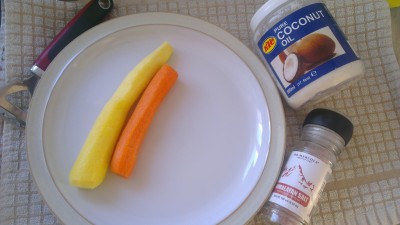
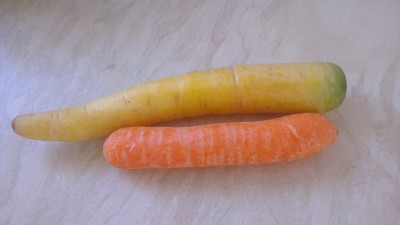
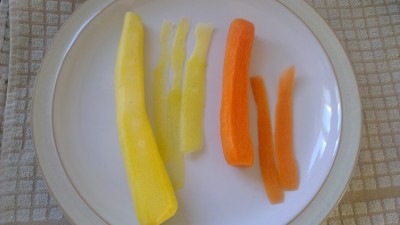
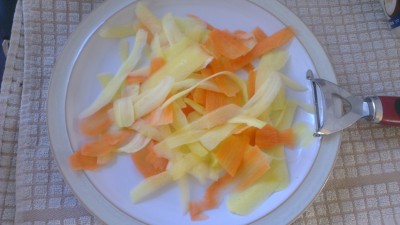
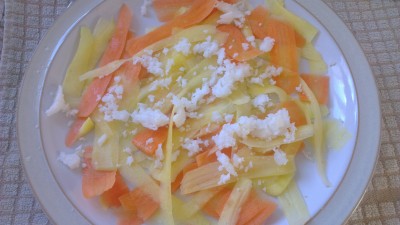
Any chance of more info on the importance of vinegar type?
Hi Seth. Basically all vinegar contains the acetic acid, but some vinegars also contain fungal and/or bacterial toxins. If you want the absolute safest and purest option – go for a distilled white vinegar.
I love the carrot salad 🙂 I have started to crave it all the time now. Rainbow carrots are so pretty too!
Yeah! I think the yellow and white rainbow carrots may be the best due to having less beta-carotene (which eaten daily, in excess, has an anti-thyroid effect).
Carrots are my favourite. this is why I love your article.
Thank you so much for great info 🙂
I had an histerectomy three years ago, can I still have this carrot salad?
Yes, it’s just a normal food.
Is it important to peel the carrot? If so, why? Also,I usually grate it. Is that somehow different than your technique?
No. You do not have to peel it.
Can this salad be made up in batches ahead of time or is it most beneficial to consume immediately?
Some people think leaving it in a fridge overnight actually helps (because it degrades some of the beta carotene – which some people think is bad). Leaving it longer than 24 hours is probably not a good idea.
Is there any time of the day which this would be best to eat at.
Can I eat this with other things or better to eat alone?
Better alone
Between main meals. I usually have it 90 minutes after breakfast.
Ive had total hysterectomy will i still get the same effects for my menopause ?getting the hormones naturally if i eat this salad
It will still help your body to remove detoxified hormones expressed into the bile, yes. I would eat it if I was experiencing hormonal/hysterectomy related menopause issues.
Will boiled carrots have a similar effect? I don’t eat raw carrot as they are high oxalate. Is dikon good in the same way?
No, boiled carrots will not contain the beneficial fibres. It needs to be raw so the fibre is intact and can carry the detoxified hormones (contained in bile) out of the body.
I’m not sure how the oxalates in raw carrot interact in the body, but my understanding is that the carrot remains undigested for the most part. It might be slightly nutrient-subtractive overall, but every single food has some benefits and some drawbacks. The benefits for raw carrot vastly outweigh any potential negatives. Dikon is not good in the same way, although bamboo shoots are, and also cooked mushrooms to some extent.
The outer skin should not be removed as posted. This layer is the most beneficial
Hi Zachariah,
Hmm, yes that makes sense. The outer skin is the bit in contact with the soil and so should have the best properties for protecting the carrot against infection. This should transfer over to the salad, with the outer layer having great sterilising effects in the bowel.
I’ll update the post.
Great – thanks! Do you think there’s any reason not to add a bit of raw garlic? Or a few toasted sunflower/pumpkin seeds? I’m thinking that they’re all anti-parasitic and will all taste delicious together. Possibly also feta cheese too? Or is that just too much and will defeat the point of the salad?!?
The garlic is a good idea. I’m not too keen on the seeds because of the high PUFA content (which are converted to inflammatory prostaglandins by the COX enzyme). Pumpkin seeds are the better of the two due to high zinc mineral content, but even so, I wouldn’t add loads – just a few will be fine.
I used to add cheese sometimes – perhaps it lowers the salad’s effectiveness somewhat, but it really helped me to fully consume the salad, which can get tiresome and hard to finish day after day.
Hi Joe. Love your article and learned so much. I am on a continuous learning curve and recently stopped using any oil for cooking (and chemical laden stocks) as well as on salads, especially so-called extra virgin olive oil which is highly adulterated with cheaper toxic oils and a complete waste of money. I have gone back to basics, cooking with lard (which makes me feel quite sick as I don’t like meat and stick to wild caught fish, which I also don’t like but don’t know how else to get enough protein and omega 3). Thankfully the aroma of the cooking onions overtakes the lardy smell. I use Himalayan salt now instead of stock as I also prefer the taste. I didn’t realise that nuts and seeds are also bad (I absolutely love roasted almonds and cashews which I dry roast myself, no oil or salt), and eat far too much every day. I will give these up and stick to the pumpkin seeds. In regard to oxalates, I have read that too much causes crystal formation in the kidneys as well as other parts of the body. Certain foods have higher levels than others, spinach and peanuts being top of the list.
Turning to your carrot salad, which I will now try, did you find that gut gas was reduced (sorry to get personal but this has become a big problem for me these days and not sure if it’s due to bacterial overgrowth or just a symptom of menopause). Apologies for the lengthy comment.
Sou
Hi Sou,
The salad may reduce gut gas, depending on what else you are eating.
I find that avoiding undercooked starches has the best effect on reducing flatulence. Make sure every bowl of rice, every pizza base, every mashed potatoes, etc., are well cooked – very well cooked if this is a big problem for you. Raw fruit can also contribute – so better to cook your apples than eat raw.
Like you, I also try not to cook with any oils. The main problem being the production of toxic aldehydes when oils are heated, in addition to polyunsaturated fatty acids (PUFAs). I’m not a big fan of lard – it’s okay as far as fats go but not ideal. I would consider it as slightly better than olive oil. Even better than either are beef dripping and butter, but the best fat/oil to cook with in my opinion is fully hydrogenated coconut oil. Coconut oil is very low PUFAs already, but the full hydrogenation process completely removes the remaining trace amounts, converting them to regular saturated fats. This gives a gold standard cooking fat/oil in terms of health and oxidation potential. The problem with even low amounts of PUFA is that an enzyme called Cyclooxygenase (COX) in our body converts PUFAs into pro-inflammatory prostaglandins. The fully hydrogenated coconut oil therefore has a significantly reduced inflammatory potential compared to other oils.
Regards,
Joe
How can I tell if my coconut oil is fully hydrogenated? Any brand recommendations? Thanks.
It should say on the packaging or description. It has a harder consistency than regular coconut oil. I use a french brand called Vegetaline.
Hello
Could you recommend a light to some in australia who has plenty of sun – is a red light still absolutely necessary?
If I add vinegar and oil to my blender drink of carrot, pineapple juice, pineapple chunks and lemon slice does this change the benefits?